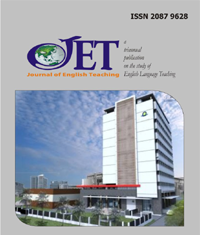Utilizing the RAFT Strategy: Its Effects on the Writing Performance of Filipino ESL Learners
DOI:
https://doi.org/10.33541/jet.v6i3.1982Keywords:
RAFT strategy, writing performance, Filipino, ESL learners, English as Second LanguageAbstract
This experimental research described the effects of RAFT strategy on the writing performance of 10th graders Filipino ESL learners. Forty learners were identified as having nearly the same performance and grouped as experimental and control. The writing tasks used were taken from the actual module used by the Department of Education-Philippines in classroom learning. Two groups were rated using a scoring rubric. The researcher used t-tests, means, and standard deviations included in the Social Sciences Statistical Package (SPSS). The study revealed that the participants had more or less the same knowledge on essay writing. The post-experimental test taught through the RAFT strategy obtained a score of 91.35 percent described as Outstanding while the control group exposed under the conventional strategy had an 88.55, Very Satisfactory. Moreover, both groups have significant differences between their pretests and posttests. A statistically significant difference between the mean scores of the experimental and the control group as the p-value of .011, which is lower than the critical value of 5 percent, in persuasive and argumentative essay writing performance was found. Hence, the use of RAFT as a strategy in teaching writing is found to be effective in teaching persuasive and argumentative essays.
Downloads
Published
Issue
Section
License
Copyrights for articles published in JET are retained by the authors, with first publication rights granted to the journal. The journal/publisher is not responsible for subsequent uses of the work. It is the author's responsibility to bring an infringement action if so desired by the author.



